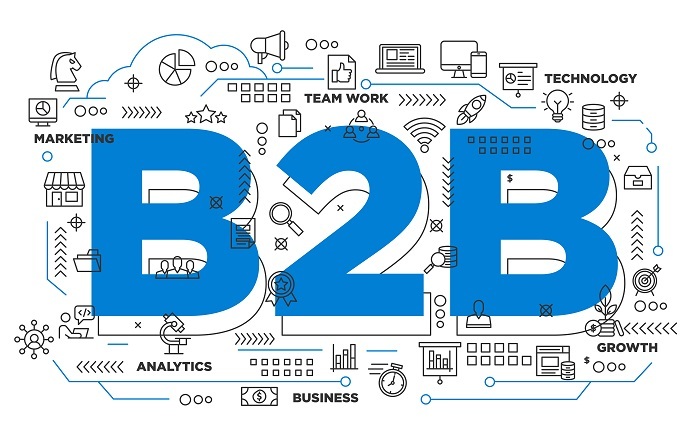
 Data Structure
Data Structure Networking
Networking RDBMS
RDBMS Operating System
Operating System Java
Java MS Excel
MS Excel iOS
iOS HTML
HTML CSS
CSS Android
Android Python
Python C Programming
C Programming C++
C++ C#
C# MongoDB
MongoDB MySQL
MySQL Javascript
Javascript PHP
PHP
- Selected Reading
- UPSC IAS Exams Notes
- Developer's Best Practices
- Questions and Answers
- Effective Resume Writing
- HR Interview Questions
- Computer Glossary
- Who is Who
What\'s Working in B2B Social Media Marketing?
Social media platforms used for advertisement and interaction between organizations are referred to as B2B networks. Making connections with these other firms and people in the field is a goal of B2B marketing via social media. It also tries to advertise products and services.

B2B enterprises may contact and interact with their potential customers on social media channels at a low cost. Publishing and disseminating material on social networking platforms that speaks to the wants and requirements of other organizations is known as business-to-business (B2B) marketing on social networks. Blog entries, whitepapers, research papers, documentaries, animations, and other materials fall under this category.
B2B marketing on social media entails more than just advertising services and products. Moreover, it involves creating connections and innovative thinking in the sector.
Due to its focus on corporate communication and relationship development, LinkedIn is the most frequently utilized social media site for B2B marketing. Based upon that target customer base and the marketing objectives, other channels like Twitter, Youtube, and Instagram might also be useful for B2B marketing. Businesses must have a clear plan for B2B social media marketing that involves determining the intended market, picking the best social media sites, producing interesting and educational material, and gauging the effectiveness of their campaigns.
In conclusion, B2B social media marketing may be an effective strategy for companies trying to increase their clientele, forge new alliances, and become thought of by others in their industry.
Why companies need B2B for Social Media Marketing

Companies require B2B social media advertising for a multitude of reasons, including to showcase their offerings and for networking purposes. Here are a few main reasonings ?
Attract a larger audience ? Social media platforms give B2B businesses the chance to connect with more prospective customers and potential suppliers than they might through more conventional marketing avenues. Firms may draw in other organizations' awareness and increase brand recognition by producing interesting and educational material for digital networking.
Develop thought governance ? B2B social media marketing may assist businesses in being recognised as thought innovators in their respective fields. Organizations may show their knowledge and gain the trust of prospective clients by publishing informative information and interacting with other organizations on social media.
Create connections and relationships ? B2B social media advertising allows organizations the chance to get in touch with and create connections with other organizations and experts in the field. New commercial possibilities, relationships, and joint ventures may result from this.
Cost-effective ? B2B marketing through social media has the potential for being a more affordable method of reaching new clients and promoting products and solutions than conventional advertising methods. The majority of social networking networks are free to access, and internal content creation is an option.
Results that can be measured ? B2B advertising on social media may deliver outcomes that can be measured, enabling businesses to monitor the effectiveness of their initiatives and modify their tactics as necessary. To assess the success of advertising on social media programs, measures including involvement, hits, and revenues may be employed.
Ultimately, social networking for business marketing is a crucial resource for companies trying to increase their exposure, develop innovative solutions, forge connections, maintain connections, and effectively advertise their goods and services.
Working in B2B Social Media Marketing
The most effective strategies for B2B social media marketing might change according to the target market and the campaign's objectives. Nevertheless, there are several approaches and techniques that have succeeded in B2B social media marketing. These are a few examples ?
Making and disseminating valuable information ? B2B businesses that make and disseminate useful material on social media may position oneself as public intellectuals and win over prospective clients. The demands and problems of other firms can be addressed via blog articles, publications, testimonials, films, and visuals.
Connecting with other companies on social media ? B2B social media marketing involves more than simply advertising offerings; it also entails establishing connections. Building relationships and a community of possible customers and collaborators may be accomplished by communicating with other organizations on social media by responding, tweeting, and enjoying their material.
Employing LinkedIn for B2B marketing ? LinkedIn is the most commonly used platform on social media for B2B interactions and professional connections. B2B organizations may network with other organizations on LinkedIn, joining relevant groups, and take part in professional conversations.
Include video material ? Social networks are growing more trendy with media content, which B2B businesses may use to display their goods and services. Demonstrations of products, testimonies from clients, and explanation videos are a few examples.
Using sponsored content ? B2B businesses may advertise their goods and services for an appropriate price by using paid advertising on social networking websites to connect with their target market. Organizations may target certain sectors, employment history, and many other characteristics using the targeting capabilities available on sites like LinkedIn and Facebook.
A clear plan that is in line with the targeted audience and business goals must be developed, and it must be tested and improved over time based on quantifiable outcomes.
The best way to develop a B2B social media marketing plan
Many phases are involved in designing a B2B social media marketing plan, such as determining the intended audience, establishing goals, choosing the appropriate social media sites, publishing articles, and tracking the outcomes. Establishing a B2B social media advertising strategy should take into account the following crucial steps ?
Define the target audience ? The intended audience must be established before any material is generated or a website for social media is chosen. This entails determining the kinds of companies or sectors to target in addition to the positions and responsibilities of the judges who are going to be considering the products or services being offered.
Establish objectives ? After determining your targeted audience, decide what your social networking advertising campaign's particular, quantifiable objectives should be. This can entail raising brand recognition, customer referrals, or growing website traffic.
Platform selection for social networks ? Decide which social media sites will be most successful based on your target market and marketing objectives. For B2B marketing, LinkedIn is a well-liked site, however, when targeting a particular population, Tumblr, Instagram, and Snapchat may also be useful.
Develop content ? Establish a strategic plan that is in line with the marketing objectives and intended audience before developing any content. A few examples of this kind of content are blog articles, publications, testimonials, films, and visualizations. The writing must be interesting and instructive, and it ought to speak to the problems and demands of other companies.
Engage with other businesses ? Interact with other companies by enjoying, promoting, and responding to their material on social media, which is a two-way discussion between organizations. Attachments and partnerships may be formed as a result.
In summary, constructing a B2B marketing strategy for social media will include determining the intended market, assigning tasks, picking the official notification, coming up with ideas, interacting with other companies, and tracking the outcomes.
A productive social media advertising plan may assist B2B businesses in expanding their client base, fostering partnerships, and establishing innovative solutions within their sector.

